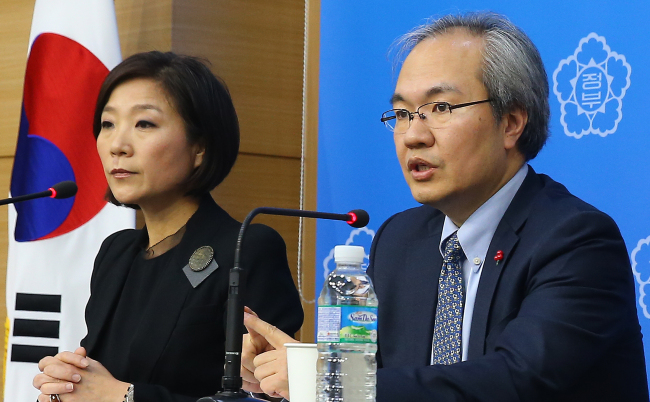Korean aid worker in Sierra Leone to be sent to Germany for Ebola test
By 이현정Published : Jan. 2, 2015 - 17:34
A South Korean health care worker who had been caring for Ebola patients in Sierra Leone is to be sent to a hospital in Germany after reporting worries of a possible Ebola infection, the government announced Friday.

The health professional, who had been working in the West African country since Dec. 27, tore a protective glove while drawing blood from an Ebola patient Tuesday. The professional’s exposed skin then inadvertently made contact with the needle, the Health Ministry said. The Ministry requested that the gender of the health care worker not be revealed.
“To be more precise, the worker said, ‘It felt like the needle grazed my skin,’” Park Jong-chul from the Health Ministry told The Korea Herald.
The worker’s glove became torn because the patient was moving while blood was being drawn, said Kwon Jun-wook, the director general of public health policy at the Health Ministry. The Ebola patient’s condition was serious, he added.
The highly contagious Ebola virus is spread by direct contact with bodily fluids of infected patients, such as blood, sweat, saliva or semen.
The health care worker, who has no symptoms of Ebola, will be sent to a hospital in Berlin on Saturday to be tested and monitored, said Oh Young-ju, the director-general for development cooperation at the Foreign Ministry. The worker will be monitored at the German hospital for at least 21 days, the incubation period of the virus, he added.
“We have decided that the health care worker should stop working and that his or her condition should be monitored,” Oh said at a press conference on Friday.
The health professional is one of the first batch of 10 Korean medical personnel who left for Sierra Leone last month to help the country cope with the deadly disease. The team received safety education in London before arriving in Sierra Leone between Dec. 15 and 20.
The U.S. Centers for Disease Control and Prevention’s safety guidelines for health care workers treating Ebola patients calls for them to be fully covered with no skin exposed, undergo repeated training and receive supervision while wearing and removing their protective equipment.
Oh from the Foreign Ministry said a British medical professional had an experience that was similar to that of the Korean health care worker and was quarantined, but did not show any symptoms for 21 days and returned to work safely.
The hospital in Berlin where the Korean health care worker will be monitored is equipped with required quarantine units and has medical doctors who have treated Ebola patients before, the foreign and health ministries here said.
In spite of the incident, the ministries said South Korea would dispatch its second batch of medical professionals to West Africa later this month as planned.
The death toll from the Ebola outbreak, which has been mostly confined to West Africa, has risen to 7,905, the WHO said on Wednesday. Sierra Leone, in particular, accounted for 337 of 476 new laboratory-confirmed cases since Dec. 24.
The deadly disease, which causes severe bleeding, vomiting and diarrhea, has no known cure but several leading drugmakers have developed vaccines that are currently undergoing clinical trials.
By Claire Lee (dyc@heraldcorp.com)


















